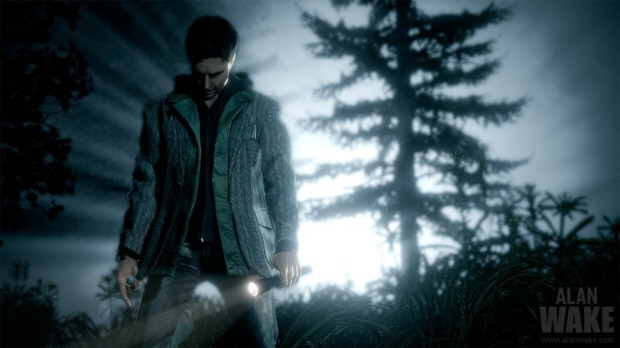Set in the town of Bright Falls, the game sees our eponymous protagonist escaping to the wilderness with his wife Alice, in an attempt to overcome his writer's block. A professional novelist, Alan causes a stir as he arrives in town as a celebrity. But the warm welcome doesn't last long and soon Alice disappears and Alan is beset by the powers of darkness. Using light as our only defence, the player guides Alan through the backwoods in an effort to find out what is really going on, and in turn, to save his wife.
The bulk of the game is played out like a survival-horror game, very much in the same style as Resident Evil, with item management an important part to your survival. You find yourself using light to defuse the defensive powers of the darkness, and regular weapons to finish off your enemies. Flares, flash grenades and flashlights are your best friends. To be perfectly honest, I didn't find the combat particularly satisfying. The use of light is clever, but these encounters became far too repetitive and almost every enemy can be dispatched in more or less the same manner. I found myself thinking that - coming from an adventure gaming background - I would have found the game far more rewarding had it been executed in a Fahrenheit / Heavy rain manner, with contextual attacks and quick time events replacing full-on action game play. This would have allowed me to focus even more on the real gem of the piece - the plot and setting.
What really sucked me into the game and made me continue playing - even though I'm not good at playing scary games, and despite my qualms with the combat - was the strong game world that was created. The storyline starts off simple, but different layers are revealed as you play through further. Collecting hidden manuscript pages and watching hidden television sets are among the methods used to expand the players knowledge of events. A deep back story begins to reveal itself and we learn of the sinister history hidden beneath the lake at Bright Falls.
The game succeeds in creating a thoroughly unnerving atmosphere, where the sense of impending danger is always just around the corner - but it is often played out with subtlety. The little strange things are often the most disturbing. I think a lot of adventure games could learn from the sense of place and mood the game generates. Lighting and sound effects were particularly effective in making everything seem unsettling - whether it was innocent or not. The soundtrack was also very well crafted. A mixture of classic and current artists perfectly complimented the action, and Roy Orbison's In Dreams for instance made me feel exactly like I was inside a David Lynch film.
The cast of the title are also well-developed. With Alan and his manager Barry as the two central figures. Barry is the comedy foil to the agitated and strung-out Alan. The two make a great partnership and this relationship succeeds in lightening the tone when things begin to get too unpleasant - and never strays into being too ridiculous when measured against the serious tone of the rest of the game. Many conventional horror stereotypes are used to great success - the fact that a lot of events that occur can be predicted did not spoil the experience for me, I enjoyed recognising these and watching events unfold. Along with references to the Twilight Zone, it was another factor which made the game feel like a film or TV mini-series - as it is also presented in episodic chunks, complete with flashback intros and ending music.
I don't think a lot of adventure fans will be taken with the charms of Alan Wake. Its action sequences can get frustrating and samey, but the universe the game invented made me keep going back for more, wanting to find out the truth - much like a good mystery adventure. Get past the niggles of combat and the atmosphere is thoroughly rewarding and the tale woven will keep you hooked.
Of course, like any good horror film, the cliffhanger ending begs for a sequel. I hope the sales of the first game convince Microsoft to fund the next instalment.
Alan Wake is out now on Xbox 360 and two DLC chapters have also been released over Xbox Live: The Signal and The Writer.





